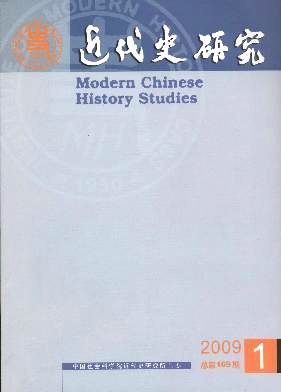《近代史研究》2009年第1期
2020-10-21 15:58:53 来源:中国社会科学院近代史研究所 点击:
一、中文目录
专题论文
蔡锷与小凤仙 ——兼谈史料辨伪和史事考证问题 曾业英(4)
晚清改进、收回领事裁判权的谋划及努力 李育民(35)
同乡、同门、同事、同道:社会交往与思想交融 ——《新青年》主要撰稿人的构成与聚合途径 杨 琥(54)
中国国民党六届临时中全会之研究(1948.4.4—4.6) 刘维开(73)
中财委的创立和组织机构 迟爱萍(91)
华阳桥乡:水、肥、土与江南乡村生态(1800-1960) 王建革(111)
学术讲演
新文化史、微观史和大众文化史 ——西方有关成果及其对中国史研究的影响 王 笛(126)
问题讨论
李德来华的身份及任务新探 王新生(141)
读史札记
翁文灏与梁思成兄弟的获助 李学通(152)
学术综述
“林献堂 蒋渭水——台湾历史人物及其时代”学术研讨会综述 赵金康 (155)
二、中文内容提要
蔡锷与小凤仙——兼谈史料辨伪和史事考证问题 曾业英(中国社会科学院近代史研究所研究员)
[内容提要]蔡锷任职袁世凯北京中央政府期间,结识了年仅十六七岁的风尘女子小凤仙。小凤仙本不是“名妓”,更非助蔡出京的“侠妓”。这些“美誉”皆源于为反袁称帝献出了年轻生命的蔡锷的英名。蔡锷与小凤仙的交往,只是他返回云南发动护国战争谋略中的一环,不存在所谓“相恋”的问题。其京津脱险,经历了出京和离津两个步骤,出京并未逾越袁世凯所允许的范围,惟有离津才称得上“潜逃”。小凤仙对蔡锷的成功返滇起了一定的掩护作用,却是她始料不及的,但其祭奠蔡锷的行为理当受到尊重。历史研究不能盲目随“后现代”理论起舞,应高度重视史料辨伪和史事考证工作。
[关键词]蔡锷 小凤仙 袁世凯称帝 史料辨伪 “后现代”理论
晚清改进、收回领事裁判权的谋划及努力 李育民(湖南师范大学历史文化学院教授)
[内容提要]晚清时期,由于领事裁判权有着种种弊害,中外双方均感不便,产生了改进这一条约特权的意向。第二次鸦片战争之后,清政府和英国均谋划补救之法。英国提出“混合法庭”方案,为清政府所接受,但这一计划归于流产。“滇案”对领事裁判权制度产生了重要影响,“观审”制度的建立,在某种程度上是“混合法庭”的变通;赫德提出新的方案,亦为清政府和不少官员所关注。甲午战争和八国联军之役,激起了收回领事裁判权的强烈要求。清政府明确地提出了这一问题,采取了改革司法法律制度的实质性行动,但陷入了不易解套的困境。清政府的谋划和努力收效甚微,与日本比较,它存在着种种失误和弱点,它所背负的沉重的传统包袱,限制了它的思路和作为。其局限和教训,对后世无疑是有益的启示。
[关键词]领事裁判权 晚清 中外关系 改进 收回利权
同乡、同门、同事、同道:社会交往与思想交融——《新青年》主要撰稿人的构成与聚合途径 杨 琥(北京大学校史馆副研究员)
[内容提要]五四新思潮的核心力量,是以《新青年》杂志为阵地和纽带而结合形成的一批知识分子和青年学生;他们经由地缘、师友、革命同道以及思想主张的相互吸引与呼应等几种途径聚合而成新文化阵营。新思潮核心力量的聚合与分化,反映了五四时期中国知识分子新旧杂糅、政治主张对立歧异而思想观念则相互交融的复杂性;在发动新文化运动的过程中,它本身也经历了由依赖同乡、同门、同事等传统的社会人际关系向以思想主张一致为基础的新型社会交往方式的转变。新思潮核心力量是一联合阵营,但并非一个具有严密组织的政治团体,在五四新文化运动的高潮之后,它的分裂与重组势所必至。
[关键词]《新青年》 五四新文化运动 社会交往 思想交融 聚合途径
中国国民党六届临时中全会之研究(1948.4.4—4.6) 刘维开(政治大学
[内容提要]中国国民党第六届中央执行委员会临时全体会议只有一个议题,即讨论中国国民党对行宪后第一任总统、副总统候选人的提名问题。但是由于中国国民党总裁蒋中正在会议中声明不参加总统竞选,引起与会者的震惊,使会议讨论的重点由党是否要提名总统、副总统候选人,转变为总裁是否应该参选总统。最后在与会者集体表决以及尊重蒋中正个人主张的情形下,对于总统、副总统候选人提名问题,会议形成与会者一致同意的决议:“请总裁为第一届总统候选人”,遵照总裁之指示,“本届总统、副总统之选举,本党不提候选人”
[关键词]中国国民党 蒋中正 胡适 中央委员会 总裁
中财委的创立和组织机构 迟爱萍(中共中央文献研究室研究员)
[内容提要]成立中央财政经济委员会及其后的政务院财政经济委员会(简称为中财委)是中共中央建国前后,为适应各大解放区财经统一需要,顺利实现由革命战争到经济建设的转变,所采取的一项重大组织措施。中财委在中央人民政府中有着重要位置;是国民经济恢复时期组织实施中共中央、政务院一系列重大财经方针和政策的重要领导机构。本文从中财委机构的前身、成立过程、组织构成和人员、工作机制的确立四个方面,对该组织进行了研究。
[关键词]华北财经办事处 中央财政经济部 华北财经委员会 中央财政经济委员会 政务院财政经济委员会
华阳桥乡:水、肥、土与江南乡村生态(1800—1960) 王建革(复旦大学历史地理研究中心教授)
[内容提要]上海松江县华阳桥乡水利、肥料和土壤之间的生态联系,反映了近代江南农村传统农业生态的变化,其中水是江南生态的核心。华阳桥乡传统时代的农业生态,几乎是江南上千年农业生态结构的缩影。1950—1960年期间,水、肥、土三个要素发生了巨大变化,包括水面整治,大积土杂肥,改变耕作制度,由此引起了土壤生态先向结构良性后向积水变坏的方向发展。水肥环境的转变也对乡村卫生甚至城市环境产生了影响。三要素之间的互动,构成乡村自循环生态关系的主要特征。
[关键词]江南 农业生态 水利系统 土杂肥
新文化史、微观史和大众文化史——西方有关成果以及对中国史研究的影响 王 笛(华东师范大学思勉人文高等研究院紫
[内容提要]本文介绍近年来西方史学界关于新文化史、微观史、大众文化史研究的发展及其对中国史研究的影响。这些研究大多把普通人作为他们研究的主要对象,注重多学科交叉研究手段,强调叙事和细节的人文的历史学方法。一些新课题如日常生活、物质文化、性别、身体、形象、记忆、语言等得都有重要成果。文章最后还就大众文化、精英文化与国家权力,资料、资料解读及其运用,历史学是否因其他学科的“侵入”而陷入危机,特殊性与普遍性,日常取向与宏大叙事等问题进行了讨论。
[关键词]新文化史,微观史,大众文化史,中国史
李德来华的身份及任务新探 王新生(中共中央党史研究室研究员)
[内容提要]从20世纪80年代开始,一些回忆和研究文章认为,李德的真实身份是苏联情报人员,他任中共中央军事顾问不是共产国际派遣的,而是中共临时中央负责人博古邀请的。近年来俄罗斯公布的档案资料证明:李德到达中国后的身份是苏联红军参谋部第四局人员。苏联红军参谋部第四局的确是情报部门,但其对中国的工作性质与共产国际有着密不可分的关系。李德是被苏联红军参谋部第四局派到远东局工作的,任务是整理中国苏区的军事报告,供联共(布)、共产国际高层进行有关决策参考;并作为中共中央军事顾问组成员,协助远东局书记埃韦特指导中国苏区的军事行动。李德到中央苏区指导军事工作是经远东局提议共产国际批准的,不是博古邀请而去的。
[关键词]李德 共产国际 远东局 军事顾问
翁文灏与梁思成兄弟的获助 李学通
“林献堂 蒋渭水——台湾历史人物及其时代”学术研讨会综述 赵金康
三、英文内容提要
Modern Chinese Hisrory Studies No.1, 2009
Cai E and Xiao Fengxian—Including a Discussion of the Problems of Authenticating Historic Data and Verifying Historic Facts / Zeng Yeying (4)
During his service in Yuan Shikai’s Beijing central government, Cai E got to know Xiao Fengxian, a prostitute only sixteen or seventeen years old. Contrary to popular legend, Xiao Fengxian was not a “famous courtesan,” to say nothing of being a “courtesan heroine” who helped Cai E to escape
Plans and Efforts to Improve and Rescind Consular Jurisdiction during the Late Qing Period / Li Yumin (35)
During the late Qing period, the many drawbacks of consular jurisdiction were an inconvenience to Chinese and foreigners alike, and gave rise to a consensus that this treaty privilege ought to be reformed. After the Second Opium War, both the Qing government and
Compatriots, Colleagues, Coworkers and Comrades: Social Intercourse and Intellectual Confluence—The Key Contributors to New Youth, Their Composition, and the Paths that Brought Them Together / Yang Hu (54)
The core of the May Fourth new intellectual movement was a group of intellectuals and young students based at and connected through the New Youth magazine. They were brought together by many factors, including regional connections, school ties, revolutionary comradeship, and intellectual affinity, and formed a new cultural camp. The aggregation and differentiation of the core of the new intellectual movement reflected the complexity of Chinese intellectuals during the May Fourth: their blending of old and new, and the way they combined a diversity of political positions with intellectual confluence. The composition of the group experienced a transition from traditional social relationships based on hometown, school, workplace and so on, to a new style of social intercourse based on common ideology. The core force of this new intellectual movement presented a united front, but was not a rigorously organized political body, and its breakup and reorganization after the climax of the May Fourth Movement were inevitable.
A Study of the Provisional Congress of the Sixth Guomindang Central Executive Committee (1948.4.4-4.6)/ Liu Wei-kai (73)
The only item on the agenda of the Provisional Congress of the Sixth Guomindang Central Executive Committee was to discuss the nomination of the Guomindang’s candidates for the first president and vice-president of the Chinese government after the implementation of the constitution. However, since Generalissimo Chiang Kai-shek announced to the amazement of the delegates that he would not run for president, the Congress’ focus of discussion shifted from whether or not the Party should nominate candidates for president and vice-president, to whether or not Chiang Kai-shek should run for president. Finally, on the basis of a collective vote and out of respect for Chiang Kai-shek’s wishes, the Congress reached a unanimous decision “asking the Generalissimo to run for president,” and accepting the Generalissimo’s directive that “the Party does not nominate any candidates for president and vice-president in this election.”
The Establishment of the Central (and State Council) Financial and Economic Committees and Their Organizations / Chi Aiping (91)
Huayang Qiao Town: Water, Fertilizer, Soil and the Rural Ecology in Jiangnan, 1800-1960/Wang Jiange (111)
New Cultural History, Microhistory, and Popular Cultural History: A New Trend in the West and Its Impact on Studies of Chinese History / Wang Di (126)
New Research on Otto Braun’s Position and His Mission in China / Wang Xinsheng (141)
Since the 1980s, a number of memoirs and articles have argued that Otto Braun (called Li De in Chinese) was really a Soviet intelligence officer, and that his appointment as military advisor to the Central Committee of the Chinese Communist Party(CCP) did not come from the Communist International, but was at the invitation of Bo Gu, the Party’s interim leader. Documents made public by Russia in recent years prove that Otto Braun’s position after his arrival in China was as a member of the Fourth Bureau of the Soviet Red Army. Though the Bureau was indeed an intelligence department, the nature of its work in China was intimately connected to the Communist International. The Fourth Bureau of the Soviet Red Army assigned Otto Braun to the Far East Bureau, where his task was to put together military reports on the Soviet Areas in China and provide them to the leadership of the Soviet Communist Party (Bolshevik) and the Communist International. In addition, as a member of the Military Advisory Group of the Central Committee of the CCP, he was to assist the Secretary of the Far East Bureau in directing the military actions of the Soviet Areas in China. Otto Braun went to the Central Soviet Area to direct military affairs at the proposal of the Far East Bureau and with the approval of the Communist International, not at the invitation of Bo Gu.
Weng Wenhao’s Role in Securing Chang Kai-shek’s Aid for Liang Sicheng and His Brother/Li Xuetong (152)
Seminar on “Jiang Weishui and Lin Xiantang: Taiwanese Historical Figures and Their Times / Zhao Jinkang (155)
责任编辑:国强 最后更新:2021-05-30 19:48:47
特别说明:抗日战争纪念网是一个记录和研究中国人民抗日战争历史的公益网站。本网注明稿件来源为其他媒体与网站的文/ 图等稿件均为转载稿,本网转载,并不意味着赞同其观点或证实其内容的真实性。本网转载出于非商业性的文化交流和科研之目的,如转载稿侵犯了您的版权,请告知本网及时撤除。以史实为镜鉴,揭侵略之罪恶;颂英烈之功勋,弘抗战之精神。我们要铭记抗战历史,弘扬抗战精神,坚定理想信念,为国家富强、民族复兴,实现伟大的中国梦作出新的贡献。感谢您对抗日战争纪念网的支持。
纠错电话:0731-85531328、19198230121(微信同号)
上一篇:《近代史研究》2008年第6期
下一篇:《近代史研究》2009年第2期

 湘公网安备43010402000821号
湘公网安备43010402000821号